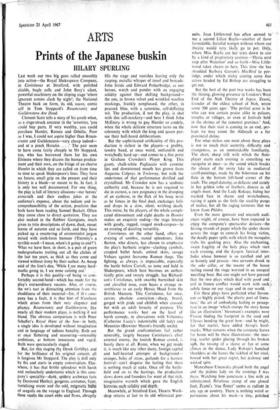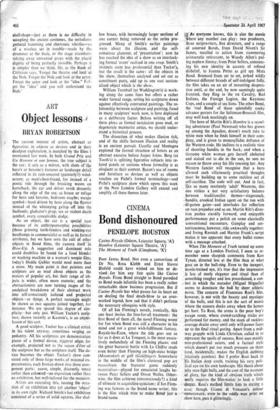Prints of the Japanese buskin ARTS
HILARY SPURLING
Last week our two big guns rolled smoothly into action—the Royal Shakespeare Company, in Coriolanus at Stratford, with polished shields, bugle calls and John Bury's silent, powerful machinery on the sloping stage 'where ignorant armies clash by night'; the National Theatre back on form, its old, suave, comic self in Tom Stoppard's Rosencrantz -and Guildenstern Are Dead.
Clement Scott tells a story of his youth when, as a stage-struck amateur in the 'seventies, 'you could buy parts. If very wealthy, you could purchase Hamlet, Romeo and Othello. Poor as I was, I could not aspire higher than Rosen- crantz and Guildenstern—very cheap indeed— and at a pinch Horatio. . . .' The- pair seem to have come fairly cheaply to Mr Stoppard, too, who has borrowed them for his own Elsinore where they discuss the human predica- ment and their own, on the fringe of an elusive Hamlet in which they are called on from time to time to speak Shakespeare's lines. They have no future, small grip on the present and their history is a blank—or meant to be. In fact, it is only too well documented. For one thing, the play is full of literary allusions—our heroes' cross-talk and their endless jokes at the audience's expense, about the tedium and in- comprehensibility of the action, proclaim that both have been reading Samuel Beckett. Often they come close to direct quotation. They are also soaked in the flabbier Georgians, much given to trite descriptions of dawn, dusk, russet leaves of autumn and so forth, and they have picked up a smattering of existentialist jargon mixed with sixth-form humour (`Eternity's a terrible.word—I mean, when's it going to end?'). What we have here, in short, is a pair of green undergraduates trotting out all the cliches of the last ten years, as thick as they come and viewed without irony by their author. As Aesop said of the lion's den, 'While I.see many hoof- marks going in, I see none coming out.'
Perhaps it is this quality—of being so com- fortably second-hand—which has made for the play's extraordinary success. Also, of course, the nrr's tact in distracting, attention from the shoddiness of their material—for, if th s com- pany has a fault, it is that hint of blandness which arises from their very elegance and pliancy. Rosencrantz and Guildenstern,• like nearly all their modern plays, is nothing if not bland. The obvious comparison is with Peter Schaffer's Royal Hunt of the Sun—in both, a single idea is developed without imagination and in language of •tedious banality. Both are at once flattering and reassuring—ostensibly ambitious, at bottom innocuous and vapid. Both were spectacularly staged.
But, for this staging (by Derek Goldby), and for the brilliance of his original conceit, all is forgiven Mr Stoppard. The play is dull only by fits and starts in empty conversation. Else- where, it has that brittle splendour with harsh and melancholy undertones which is this com- pany's speciality—dank, spidery archways (sets by Desmond Heeley), gorgeous costumes, faint, tantalising music and the odd, enigmatic Nitta of seagulls on the voyage to England. Through these vaults the court ebbs and flows, abruptly
fills the stage and vanishes leaving only the rasping, metallic whisper of tinsel and brocade.
John Stride and Edward Petherbridge, as our
heroes, watch and ponder with an engaging solidity against their shifting background—
the one, in brown velvet and wrinkled woollen stockings, frankly nonplussed, the other, in peacock blue, with a saturnine, self-deflating wit. The production, if not the play, is shot with this self-mockery—and here 1 think John McEnery is wrong to guy Hamlet so crudely, when the whole delicate structure turns on the solemnity with which the- king and queen pur- sue their half-heard deliberations.
But the sophisticated artificiality of this pro- duction is richest in the players—a grubby, tawdry band, at once weird, outlandish and wretchedly. hard up—and comes to a fine point in Graham Crowden's Player King. This gaunt, chalk-white Pagliaccio with carmine
lips and downturned mouth has grown from Augustus Colpoys in Trelawny, but with the
undertones of that performance distilled and crystallised. Mr Crowden now. has a sardonic authority and, because he is not required to die in earnest, a rare poignancy in the drooping of an eyebrow, in the flick of his bony wrist as he fences in the final duel, exchanges foils and drops in a slow, silent, writhing death.
This mime, by the players, of the whole compli- cated denouement and eight deaths in Hamlet
makes an exquisite ending—the stage littered with gaudy, ragged, rouged mock-corpses—to an evening of dazzling versatility.
Coriolanus, on the other hand, offers an evening of sombre, muted splendours. fohn
Barton, who directs, has chosen to emphasise the play's barbaric origins—clashing cymbals, cropped bullet heads, animal skins, savage Volsces against fearsome Roman thugs. The fighting, as always, is impeccable, especially the battle before Corioli, so tame and bald in
Shakespeare, which here becomes an authen- tically grim and sweaty struggle. Ian Richard- son's Coriolanus, with swarthy burnished skin and chiselled nose, even bears- a strange re-
semblance to an early Heroic Head from the British Museum. This Coriolanus, for once, carries absolute conviction—sharp, brutal, gorged with pride and childish when crossed, but with an adult ferocity of purpose. The performance works best on the level of harsh comedy, in altercations with Volumnia (Catherine Lacey's indomitable old lady) and Menenius (Brewster Mason's friendly uncle).
But the grand confrontations fail rather miserably, largely because Coriolanus's chief
external enemy, the loutish Roman crowd, is barely there at all. _Rome, when we gej inside it, is much like any "other dusty, foreign capital and half-hearted attempts at background— oranges, bales of straw, garlands for a harvest festival—can't disguise the feeling that there is nothing much at stake.'Once off the battle- field and on -to the hustings, the production slows down and founders for want of that rich, imaginative warmth which gave the English histories such soliditY and depth.
Meanwhile, at Stratford East, Theatre Work- shop returns at last to its old whimsical pur- suits. Joan Littlewood has often seemed to me a second Lilian Baylis—another of those
formidable, forceful women without whom our theatre would very likely go to pot. Only, where Miss Baylis cut her texts down to size by a kind of proprietary cosiness—'lllyria next stop after Waterloo' and so forth—Miss Little- wood takes shears to hers. This time she has
shredded Barbara Garson's MacBird to por- ridge, under which sticky coating some fine actors headed by Ed Bishop are struggling to get out.
But the best of the past two weeks has been the shining, glowing presence in London's West End of the Noh Theatre of Japan. Zeami, founder of the oldest school of Nob, wrote some 500 years ago: 'The perfect actor is he who can win certain praise alike in palaces, temples or villages, or even at festivals held in the shrines of the remotest province.' And, now that their visit is coming to an end, per- haps we may count the Aldwych as a far provin'cial shrine.
For what strikes one most about these plays is not so much their austerity, difficulty and strangeness, as an unmistakable familiarity. The short, sharp trill with which the flute- player starts each evening is something we recognise at once,---as the sound which breaks the silence of the misty lake in mediaeval scroll-paintings, made by the fisherman on his flute in the bottom left-hand corner of the. reeds. The angel dancing, so delicate and stately in her golden robe of feathers, dances as all angels must. And the Lady Rokujo, hiding her masked face in shame and, wretchedness, raising it again as she feels the stealthy pangs of malice, has all the raging torments that we know from Phedre.
Even the most ignorant and uncouth audi- ences might, of course,.have been expected to enjoy the company's spectacular devices—the hissing strands of paper which the spider shoots across the stage to enmesh his living victim, the deadly paper spills with which the mosquito, stabs his quaking prey. Also the enchanting, sweet fragility of the holy plays which start each evening, and the kyogen, farcical inter- ludes whose humour is so rarefied and yet so homely and prosaic—tivo servants drunk in the sake cellar, or the master of the house reeling round the stage worsted in an unequal wrestling bout. But one might not have guessed that the two plays which deal with good and f. evil in frozen conflict would work with such-i subtle force on our stage and in our world.
For these plays have perfected what Steven- son so highly prized, 'the plastic part of litera- ture,' the art of embodying feeling or percep-
• lion in an image 'which stamps the story borne like an illustration.' Stevenson's examples were ("rusoe finding the footprint in the sand and Ulysses bending the great bow--and he might, for that matter, have added Aesop's hoof- marks. What remains when the company leaves for home will be these illustrations—the snar- ling, scarlet spider glaring through his broken :qeb, the tossing of a sleeve or fan at some cfimax in the dance, Lady Rokujo's hunched -shoulders as she leaves the sickbed of her rival, bowed with her great regret, her jealousy and wicked spite.
Manzaburo Umewaka played both the angel and the jealous lady on the evenings I was there. Watching him punctuate a line with an infinitesimal, flirtatious stamp of one gloved fool, Zeami's 'true flower' seems as radiant in any age or country. There is nothing weird or portentous about his mask—a tiny, polished shell-shape—just as there is no difficulty in accepting the ancient costumes, the melodious guttural humming and electronic whistles—as of a wireless set in trouble—made by the drummer at the back, or the stage attendants tidying away unwanted props with the placid dignity of being perfectly invisible. Perhaps it is simpler than we think. Or, as the Book of Criticism says, 'Forget the theatre and look at the Noh. Forget the Noh and look at the actor. Forget the actor and look at the "idea." Fof- get the "idea" and you will understand the Noh.'







































 Previous page
Previous page